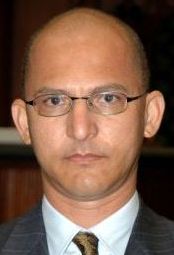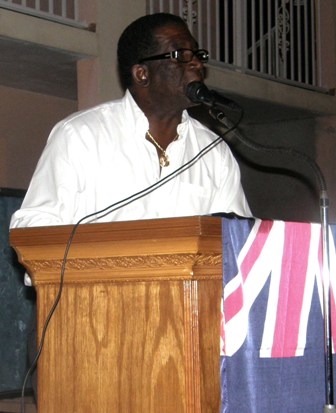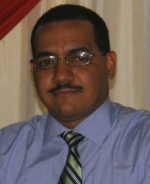Archive for July 1st, 2009

Jefferson answers critics
 (CNS): Financial Secretary Kenneth Jefferson revealed today that he had warned government about a potential major deficit back in October 2008. Giving a frank statement on the true state of government finances, he explained the reason for the apparent increase in the deficit between the end of March and the beginning of June. Jefferson said that on 9 February he had predicted a $68 million deficit, and while government made attempts to cut expenditure and generate new revenue, it had not achieved the desired results. Defending his record, he indicated that it was the failure of those policy decisions to have the desired impact — not his predictions — that has left the country with a deficit of $74 million.
(CNS): Financial Secretary Kenneth Jefferson revealed today that he had warned government about a potential major deficit back in October 2008. Giving a frank statement on the true state of government finances, he explained the reason for the apparent increase in the deficit between the end of March and the beginning of June. Jefferson said that on 9 February he had predicted a $68 million deficit, and while government made attempts to cut expenditure and generate new revenue, it had not achieved the desired results. Defending his record, he indicated that it was the failure of those policy decisions to have the desired impact — not his predictions — that has left the country with a deficit of $74 million.
In a 16 page statement to the Legislative Assembly on Wednesday morning, laying out in full the true state of government’s financial affairs and the events leading up to the announcement of the $74 million deficit, Jefferson made it clear that a similar figure was on the cards much earlier in the year and the policy decisions made in an attempt at mitigation had essentially failed. He explained that had all the cuts made in the supplementary budget happened or the stimulus package worked then the deficit could have been reduced, as hoped in March, to $29 million, but as they did not the year-end deficit is closer to the figure of $68 million predicted by the portfolio on 9 February.
Jefferson explained that he had first warned of a potential operating deficit back in October 2008 when the economy began to contract. As a result, government had issued a policy directive to the civil service and government companies to restrict the hiring of new staff; reduce spending by 6% and initiated a review of capital projects.
However, the government was advised by his office that this would not be enough to address the problem, he said. “The Portfolio of Finance and Economics advised that the policy directive, by itself, would not be sufficient to guarantee that the expenditure reductions found by ministries and portfolios would remain throughout the year unless a Supplementary Budget – that contained negative appropriations which would have had the effect of reducing budgets — was taken to the Legislative Assembly to legally reduce the appropriations,” Jefferson said, adding that he had warned of the danger that the promised reductions would not happen unless they were made official.
“The advice of the Portfolio of Finance and Economics was not taken and government agencies were allowed to spend their original budgeted appropriations despite the policy directive,” he revealed.
Jefferson said that by January of 2009 the figures for the first part of the financial year (1 July to 30 November) revealed an actual deficit of $63.6 million. Nevertheless, as that was the slowest part of the year for revenue government decided to monitor the next three months’ earnings to see if any of the deficit was made up by the revenue collected in that quarter, he said. However, it became apparent by 9 February that this was unlikely to be the case when forecasts predicted a $68 million deficit for the year by 30 June.
“The 9 February forecast pointed out that there was a contraction in economic activities negatively impacting the financial and tourism sectors,” he said, adding that it was clear then that government would need to borrow to pay for operating expenses. “It was evident that the October policy directive to cut operating expenses by 6% did not materialise,” Jefferson noted.
Given the evidence of the significant deficit and the failure of the policy directive, Jefferson said, “The elected ministers of Cabinet decided that the government was not prepared to go to the Legislative Assembly with a $68 million deficit and decided that drastic budget cuts had to be taken.”
Jefferson said that a long series of meetings than commenced with senior civil servants to inform them of the $68 million predicted deficit and that cuts had to be made. Jefferson said five meetings were held between 20 February and 12 March to bring down expenditure and bring up cash reserves to a respectable amount that could be presented to the Legislative Assembly.
“There is absolutely no doubt that Cabinet was informed by the Portfolio of Finance and Economics that a forecast for the year to 30 June … indicated a deficit position of $68 million,” Jefferson added.
He went on to explain that after the meetings the ministries offered a series of cuts that allowed the government to bring a supplementary budget to the House that showed a potential deficit of only $29 million instead of $68 million.
However, Jefferson explained that by 5 May a Cabinet note showed actual figures which made it clear the $29 million deficit was very unlikely. By then Jefferson said the actual operating deficit up to 31 March was $19 million making the $29 million prediction appear unrealistically low given the fact that the remaining three months of the year would not generate significant revenue.
“This again indicates that the $29 million forecast which was approved by the Cabinet and presented to the Legislative Assembly was understated,” he added. Jefferson explained that worse was still to come for government finances when the actuals were examined on 28 May as the statutory authorities showed even greater losses than anticipated and the government ‘stimulus package’ failed to generate any significant revenue.
“Actual revenue performance indicates that this increase to revenue figures will not materialize,” he said. “Ministers of the former government cannot distance themselves from this process and should not be surprised at the poor performance forecast for 2008/09”
Jefferson said that attempts in March to reduce the budget deficit failed, and while portfolios had “offered up” expenditure reductions, they were not sufficient. He said that as the leader of government business (Kurt Tibbetts) had not heeded his advice to “lock in” expenditure reductions in October, it proved very difficult to achieve any significant savings.
Addressing the leader of the opposition’s accusations, made on Friday in the LA, that the expenditure must have occurred after the PPM administration left office, Jefferson confirmed that he had not been given any instructions by the new UDP government regarding finances and that there had been no policy decisions taken regarding new spending, nor was he told to revise any earlier projections.
He noted that, contrary to the current misunderstanding in the public domain, the financial secretary does not have the authority to single-handedly determine how government resources are spent and said it is a collective Cabinet decision driven by the policy considerations of the elected ministers.
Facing the criticisms head on, Jefferson said the charge of incompetence leveled at him was invalid and the criticisms would translate into criticisms of the entire portfolio and the wider civil service on whom budget predictions all depend.
“I and the rest of the staff within the Portfolio of Finance and Economics have worked tirelessly and closely with Cabinet. We have always remained objective,’ he said. “Over the past four years competence and integrity were never in question. I have presented the facts,” Jefferson said.

Man charged with burglary
(CNS): Mitchum Kenjo Wood, of Frank Sound, was due to appear before the court today (Wednesday, 1 June) charged with one count of burglary in connection to a break-in at a home in Partridge Crescent on 26 June. The RCIPS says police were alerted to the crime by the homeowner after she returned from work around 7pm and found a laptop and a camera missing from the house. Following investigations, the laptop was recovered and Wood, aged 20, was arrested a few days later and charged with burglary by Bodden Town Detectives.
Residents are reminded to always have security in mind; never leave windows and doors open and secure all property. Residents should also keep records of serial numbers and take photographs of possessions so they can be easily identified should they be stolen.
Anyone with information about crime taking place in the Cayman Islands should contact their local police station or Crime Stoppers on 800-8477 (TIPS). All persons calling Crime Stoppers remain anonymous, and are eligible for a reward of up to $1000, should their information lead to an arrest or recovery of property/drugs.

Baptist Health opens in CI
(CNS): With the official opening of the Baptist Health International Center of Miami Cayman Islands in Governors Square on 1 July, Baptist Health of South Florida now has local representation. According to a release from the facility, this office will serve as an extension of Baptist Health International patient services in Miami, Florida; continuing the Baptist Health quality of care to the Caymanian Community and offering support to the local medical entities.
As members of the Baptist Health International Center of Miami team, the Cayman Island office will be managed by Nurleen Rotchel, Office Administrator and Jeanette Verhoeven, Commercial Representative.
The grand opening ceremony and cocktail reception took place on 25 June at the Caymanian Baptist Health International Center of Miami office last Thursday with over 140 attendees. Health Minister Mark Scotland presented welcoming remarks together with Baptist Health Executives. Also in attendance were members of the Cayman Islands medical sphere, health insurance companies and members of the Cayman Island community.
Baptist Health South Florida is the largest faith-based,non-profit healthcare organization in the region. Baptist Health includes Baptist Hospital of Miami, Baptist Children’s Hospital, South Miami Hospital, Homestead Hospital, Mariners Hospital, Doctors Hospital, Baptist Cardiac & Vascular Institute and Baptist Outpatient Services.
Baptist Health International Center is dedicated to providing for all of the international patient’s medical needs, including hospital admissions, outpatient testing and physician consults, as well as personal needs including travel and accommodation coordination.

Gambling banned in Moscow
 (BBC): At the Metelitsa casino on Moscow’s gaudy Novy Arbat street – a major centre of the gambling industry – blackjack tables lay tipped on their sides and roulette wheels had been cast onto the floor. Police and officials led us through the deserted rooms. The Moscow authorities said more than 100 teams of inspectors had fanned out across the city on Tuesday night, checking that every casino and gaming hall in the city had closed down for good.
(BBC): At the Metelitsa casino on Moscow’s gaudy Novy Arbat street – a major centre of the gambling industry – blackjack tables lay tipped on their sides and roulette wheels had been cast onto the floor. Police and officials led us through the deserted rooms. The Moscow authorities said more than 100 teams of inspectors had fanned out across the city on Tuesday night, checking that every casino and gaming hall in the city had closed down for good.

Bamboo Bikes
 (BBC): On the outskirts of Lusaka, Zambia, next year’s crop of bicycles is being watered by Benjamin Banda. "We planted this bamboo last year," he says, "and now the stems are taller than me. When it’s ready we’ll cut it, cure it and then turn it into frames." Mr Banda, is the caretaker for Zambikes, a company set up by two Californians and two Zambians which aimed to build bikes tough enough to handle the local terrain. Co-founder Vaughn Spethmann, 24, recalls how it all started with a game of football.
(BBC): On the outskirts of Lusaka, Zambia, next year’s crop of bicycles is being watered by Benjamin Banda. "We planted this bamboo last year," he says, "and now the stems are taller than me. When it’s ready we’ll cut it, cure it and then turn it into frames." Mr Banda, is the caretaker for Zambikes, a company set up by two Californians and two Zambians which aimed to build bikes tough enough to handle the local terrain. Co-founder Vaughn Spethmann, 24, recalls how it all started with a game of football.

Money laundering risk to football
 (BBC): Football is being used as a vehicle for money laundering, according to an agency responsible for tracking the proceeds of crime. The Financial Action Task Force (FATF) report warns football is at risk from criminals buying clubs, transferring players, and betting on the sport. It also provides a rare insight into tax evasion in British football. The report also raises concerns over human trafficking, corruption, drug trafficking and tax crime in the sport.
(BBC): Football is being used as a vehicle for money laundering, according to an agency responsible for tracking the proceeds of crime. The Financial Action Task Force (FATF) report warns football is at risk from criminals buying clubs, transferring players, and betting on the sport. It also provides a rare insight into tax evasion in British football. The report also raises concerns over human trafficking, corruption, drug trafficking and tax crime in the sport.

Alexander Hotel opens
 (CNS): Cayman Brac tourism has been given a lifeline with the soft opening of the new 32-room Alexander Hotel on 12 June (to be followed bythe Grand Opening 31 July) and can now accept large groups for the first time since category 4 Hurricane Paloma hit the island in November. Built to boost tourism on the island by Bracker Cleveland Dilbert, the Alexander will be the only operating hotel on the Brac until the Brac Reef Beach Resort, which needs to be partially rebuilt, is reopened.
(CNS): Cayman Brac tourism has been given a lifeline with the soft opening of the new 32-room Alexander Hotel on 12 June (to be followed bythe Grand Opening 31 July) and can now accept large groups for the first time since category 4 Hurricane Paloma hit the island in November. Built to boost tourism on the island by Bracker Cleveland Dilbert, the Alexander will be the only operating hotel on the Brac until the Brac Reef Beach Resort, which needs to be partially rebuilt, is reopened.
The resort, named after Dilbert’s father, was completed less than 18 months after submitting plans to the Planning Department, and suffered little damage in the hurricane. Dilbert noted that its opening provides economic stimulus for the whole island, especially businesses directly related to tourism such as car rental companies. The hotel was sold out the weekend of the Cayman Brac High School graduation on 20 June and 60% full the following week, he said.
 Dilbert is hoping to attract both local and international visitors and challenges the notion that the Brac’s only attraction is diving or that anything on the islands needs to be substandard. “Cayman Brac is the best place in the world. It’s peaceful, safe, clean and perfect for people who just want to get away from it all, but we need to lift the standards up in the Brac,” he said. (Photo: Receptionist Tanika Wright and Assistant Manager Saskia Edwards-right – at the reception desk)
Dilbert is hoping to attract both local and international visitors and challenges the notion that the Brac’s only attraction is diving or that anything on the islands needs to be substandard. “Cayman Brac is the best place in the world. It’s peaceful, safe, clean and perfect for people who just want to get away from it all, but we need to lift the standards up in the Brac,” he said. (Photo: Receptionist Tanika Wright and Assistant Manager Saskia Edwards-right – at the reception desk)
 Leading by example, Dilbert has gone to great lengths to add elegance to his hotel, with raised mahogany panelling throughout the lobby, conference and dining areas and custom built mahogany furniture throughout the property. This includes a solid 20-foot conference table, which can seat 17 comfortably but is made up of six sections that can be separated into smaller (up to six) tables that can also be removed for functions and dances. The conference room is available for $250 per day or $150 for a half day and because of the flexibility of the table, can be used for wide range of functions.
Leading by example, Dilbert has gone to great lengths to add elegance to his hotel, with raised mahogany panelling throughout the lobby, conference and dining areas and custom built mahogany furniture throughout the property. This includes a solid 20-foot conference table, which can seat 17 comfortably but is made up of six sections that can be separated into smaller (up to six) tables that can also be removed for functions and dances. The conference room is available for $250 per day or $150 for a half day and because of the flexibility of the table, can be used for wide range of functions.
 The u-shaped hotel overlooks Salt Water Pond in the West End, an area of protected wetland with a healthy population of the endangered West Indian Whistling-duck, and Dilbert said he intends to provide kayaks for guests to enjoy the wildlife and natural surroundings. The pond is only a few feet deep, so this will be very safe, he noted. A tikki bar sits on the water’s edge and Dilbert has installed a fountain on the pond, which is lit up at night. There are some interesting walks close to the hotel to look at the island’s wetland sanctuaries and a beach right opposite, he noted.
The u-shaped hotel overlooks Salt Water Pond in the West End, an area of protected wetland with a healthy population of the endangered West Indian Whistling-duck, and Dilbert said he intends to provide kayaks for guests to enjoy the wildlife and natural surroundings. The pond is only a few feet deep, so this will be very safe, he noted. A tikki bar sits on the water’s edge and Dilbert has installed a fountain on the pond, which is lit up at night. There are some interesting walks close to the hotel to look at the island’s wetland sanctuaries and a beach right opposite, he noted.
The hotel is designed so that each room has a view of the ocean from either the front or the back. The 30 one-bedroom suits and 2 two-bedroom suits each has a kitchenette and a bathroom. Regular prices are CI$125 for a standard room, CI$145 for a double queen and CI$175 for a suit. However, the Alexander is offering a special price for the Fourth of July holiday weekend of CI$279 special per room for a three-night stay.
 The dining facility and bar, which is leased to Casa Bracca, owned by Buck Grizzel, will also be offering a special menu for the 4 July dinner. The restaurant serves international cuisine and offers five separate menus daily – breakfast, lunch, dinner, bar and room service – and guests also have the option of alfresco dining on the upstairs balcony overlooking the pond and the ocean. The gift shop, which will be operated by Yvonne Walton, is expected to open shortly.
The dining facility and bar, which is leased to Casa Bracca, owned by Buck Grizzel, will also be offering a special menu for the 4 July dinner. The restaurant serves international cuisine and offers five separate menus daily – breakfast, lunch, dinner, bar and room service – and guests also have the option of alfresco dining on the upstairs balcony overlooking the pond and the ocean. The gift shop, which will be operated by Yvonne Walton, is expected to open shortly.
“The Alexander is making history for Cayman Brac,” said hotel manager, Jackie Ebanks. “It’s fantastic for the island and I’m so glad to be part of this. It’s exhilarating to be the manager – challenging but I’m up to it,” he added.


US pushes USB on secrets
 The US Justice Department said on Tuesday it was pressing ahead with its five-month-old lawsuit against UBS AG to force the Swiss bank to identify thousands of U.S. clients with secret UBS accounts. Despite recent media speculation about a possible settlement of the case, the Justice Department said in a brief filed with a Florida court that it was seeking to enforce tax compliance with the full weight of U.S. law.
The US Justice Department said on Tuesday it was pressing ahead with its five-month-old lawsuit against UBS AG to force the Swiss bank to identify thousands of U.S. clients with secret UBS accounts. Despite recent media speculation about a possible settlement of the case, the Justice Department said in a brief filed with a Florida court that it was seeking to enforce tax compliance with the full weight of U.S. law.

Dr Frank spends most on election campaign
 (CNS): According to the summary of returns on election expenses published by the Elections Office for the 20 May General Election, Dr Frank McField, who stood as a an independent candidate for George Town, spent some $37,500 on his election, the highest spending of any candidate in the race. The United Democratic Party spent just short of $30,000 per candidate and the PPM just over $31,000. Of the 43 candidates that contested the race, thirty candidates including all of the elected members have complied with the law and declared their campaign spending.
(CNS): According to the summary of returns on election expenses published by the Elections Office for the 20 May General Election, Dr Frank McField, who stood as a an independent candidate for George Town, spent some $37,500 on his election, the highest spending of any candidate in the race. The United Democratic Party spent just short of $30,000 per candidate and the PPM just over $31,000. Of the 43 candidates that contested the race, thirty candidates including all of the elected members have complied with the law and declared their campaign spending.
According to the Elections Law, however, there are no sanctions against those who have yet to reveal the money they spent on their campaigns ifthey are not elected to office. Of the independents that have declared, campaign costs have differed widely, with former UDP member and minister McField declaring $37,500 at the top end and Sandra Catron, in contrast, spending a mere $9,500.
It is also apparent from the returns that big money did not necessarily equate to big results. The People’s Progressive Movement fielded ten candidates and spent just under $31,140 on each of their candidates but only returned half of them. The United Democratic Party, on the other hand, returned nine of their eleven candidates on a budget of $29,460 per head.
Ezzard Miller, independent candidate for North Side spent a modest $19,850 on his campaign and received more than 50% of the vote and was returned to the Legislative Assembly.
Meanwhile, McField’s significant investment of $37,500 returned les than 5% of the vote, losing him his deposit. According to the summary, Burns Connolly also spent more than $35,000 but did return a significant number of votes for his first attempt and retained his deposit with over 17% of the electorate supporting him.
Bernie Bush, who only spent $13,500 on his campaign in the district of West Bay, actually received almost 40% of the vote in his constituency a greater percentage than Dwayne Seymour who was returned to office in his district of Bodden Town who received only 36.5% of the vote.

Cost cuts sought on schools
 (CNS): The new education minister, Rolston Anglin, has said that he will be seeking ways to cut the government’s bill for the total costs of the two new high schools. He told CNS that as the construction costs could not really be reduced he would be seeking a way to find significant savings in the fit-out and interiors. Billed as state-of-the-art facilities by the previous minister, Anglin has described many of the features as “extravagances". He said there were several examples that he was hearing about where the design is calling for unnecessary and extremely expensive features that are not even practical.
(CNS): The new education minister, Rolston Anglin, has said that he will be seeking ways to cut the government’s bill for the total costs of the two new high schools. He told CNS that as the construction costs could not really be reduced he would be seeking a way to find significant savings in the fit-out and interiors. Billed as state-of-the-art facilities by the previous minister, Anglin has described many of the features as “extravagances". He said there were several examples that he was hearing about where the design is calling for unnecessary and extremely expensive features that are not even practical.
Anglin said that while the buildings themselves might have been expensive, the biggest costs will come in the fit-outs and the interior, and he noted that were several things that could be addressed and he intended to do his best to save money for the public purse. “I have not gotten to grips fully with all of the challenges we face with the schools yet but we intend to look very closely at all the features and make sure we are getting value for money,” he said.
Speaking on the floor of the Legislative Assembly, Anglin had said the government had absolutely no choice but to continue with the schools, particularly on the John Gray Campus as the existing school was already suffering as a result of the onsite construction. He said, however, that there were issues that could be addressed and costs cut.
He noted that he had been told the design at the Clifton Hunter School in Frank Sound calls for a recording studio and he questioned if that was necessary. He said there were two studios on island already that could be utilized. And he also noted he wanted to see what this “open space learning” was really going to look like.
Speaking to CNS after Monday’s debate, Anglin explained that he would be examining the school features in detail and removing what he said were extravagances. He also said that the government was likely to face increased costs because of plan changes. Contradicting what the former minister, Alden McLaughlin, had said about the alleged $17 million overruns, Anglin said there had been many changes. He said there were many smaller ones and at least three more major changes. “One change alone could be as much as $3 million,” he said, adding that the former minister’s staff must not have briefed him properly if he did not think there were any significant changes.
Anglin did state that a legal team was involved, but he said the dispute was not over the fact that significant changes had been made but the actual costs of those change orders made by the previous administration.
Leader of Government Business McKeeva Bush said in his statement on 12 June that there could be as much as $17 million in overruns on the schools, a figure which developer Hunter Jones, of Tom Jones International, said was the worst case scenario but certainly possible. McLaughlin has said, however, that there is no way that changes of such magnitude had been made and just because the developer says so it does not mean it is true.